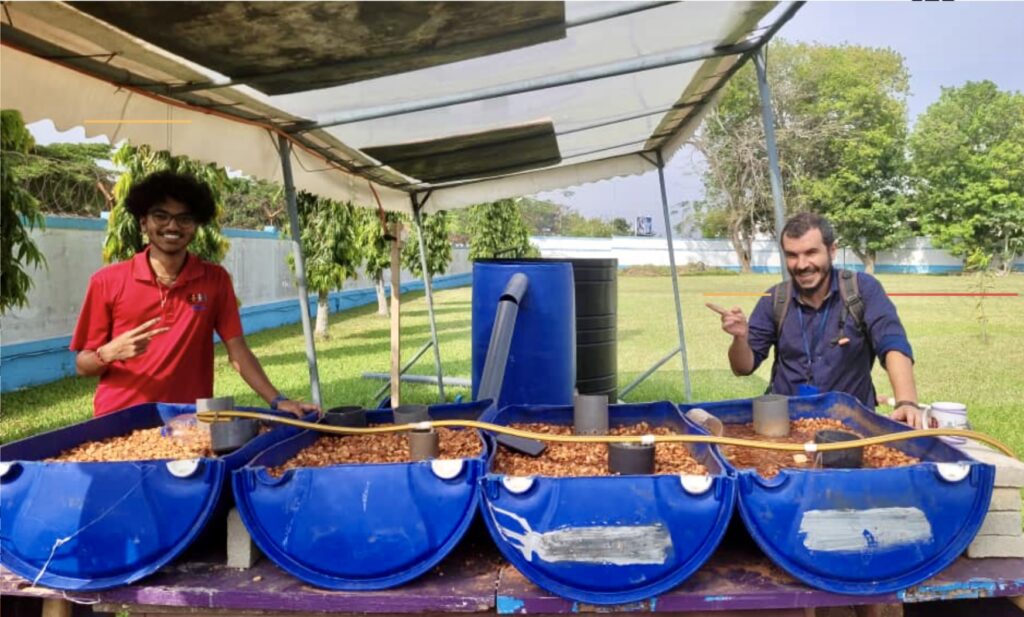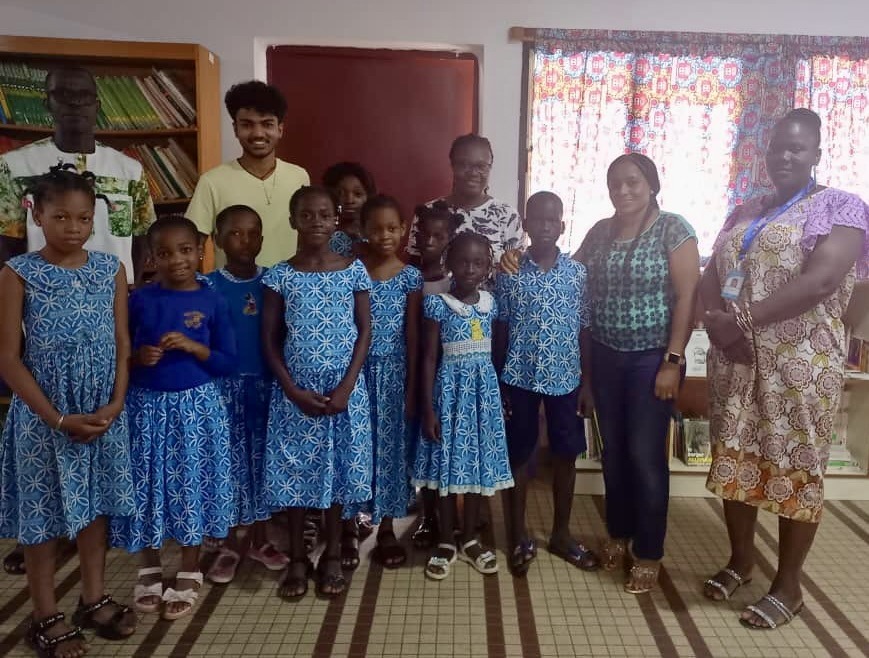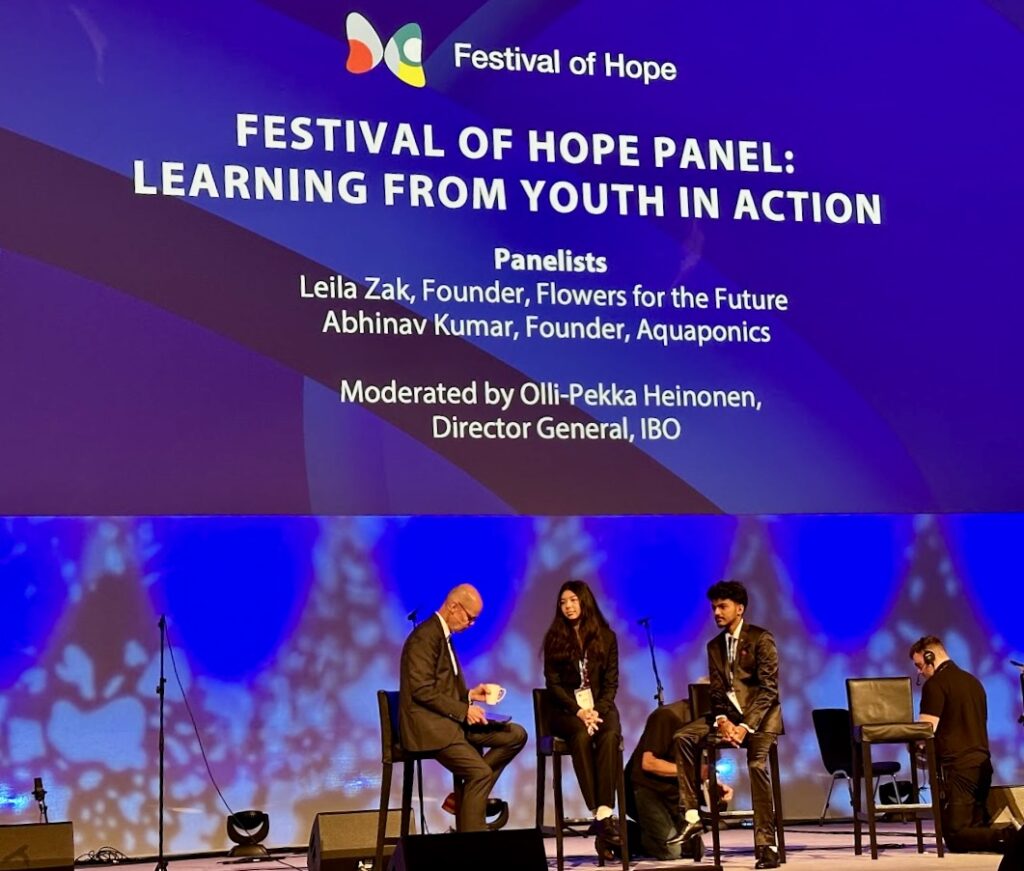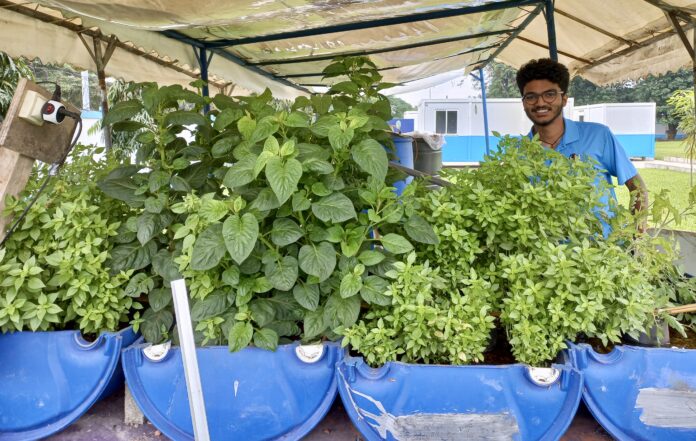When ICSA senior Abhinav Kumar arrived to Côte d’Ivoire, he didn’t notice the same food insecurity issues that were so visible in his previous home of Cameroon. But then he started talking to the local staff members. What did the custodians and drivers think were problems in the country? What needed to change?
He quickly learned that a large portion of the population here experiences hunger and malnutrition due to limited access to fresh, nutritious food. So he came up with an idea to develop an aquaponics system that would combine fish farming and organic vegetable cultivation, enabling the production of 100 kilograms of tilapia fish and over 21 kilograms of organic fruiting vegetables or 15 kilograms of leafy greens annually.
This idea garnered $3,000 in funding from the International Baccalaureate Organization (IBO) to get his system up and running, and now you can find the system, with 100 fish and large pots of leafy greens in a corner plot on campus.
How the System Works

Abhinav explains that the genius of aquaponics is how easy it is to set up. “Anyone can do it,” he says. Basically, you need a fish tank (which can be made from a variety of materials), several plant beds filled with gravel or clay pellets (called media beds), and water pumps connected to an electrical system.
Once the system is set up, the water will need to cycle for at least two weeks for enough bacteria to build up. Then, you can add fish to the tanks, and plant the seedlings. The fish will need to be fed, which results in the production of ammonia-rich waste. This ammonia travels from the fish tanks through the pipes to the plant beds, and the bacteria within the plant beds converts the ammonia to nitrates, which the plants absorb. This allows the plants to grow and to purify the water, which is recycled to the fish tank. “It’s a cycle,” Abhinav explains.
With the help of ICSA’s CAS Coordinator Ms. Nguessan and his former math teacher Mr. Lemonidis, Abhinav was able to source all of his materials locally, from agricultural companies who sell fish feed, to fish breeders, and farmers.
They chose to raise tilapia, as it’s the most commonly farmed fish in Côte d’Ivoire. It was not only easy to source, but tilapia is known to be the best fish for aquaponics beginners. The main plant growing is amaranth (a type of spinach), also known as “brom-brou” in one of Côte d’Ivoire’s many languages. The first amaranth harvest took place at the end of October, and was sold to ICSA French Teacher Ms. Diakite. This weekend will mark the first fish weighing, to check if the tilapia is ready to be grilled and auctioned.
Abhinav’s Goals for the Future

This aquaponics system, which is already producing vegetables and fish for the ICSA community, is just the beginning, according to Abhinav. He says that this is “just a prototype.” Once he harvests and makes money to put back into the system, he wants to add two more plant beds. Then, he wants to build these systems at neighboring schools; implement them at local companies and villages.
“Our goal is to construct aquaponics systems in the parts of Côte d’Ivoire that need it the most. This system not only provides a source of food but also a source of income too.”
At the end of October, Abhinav was able to visit the SOS Village’s primary school, where he’ll be implementing the aquaponics system in the near future. He says, “The enthusiasm from the students and staff was inspiring. We had insightful discussions, identifying their needs and constraints, which will guide us in tailoring the system for them.”
Abhinav says that the biggest obstacle is electricity constraints, as the system needs 24/7 electricity to run the water. He’s currently in talks with solar panel companies and is hopeful they will offer a solution. But then there’s also budget concerns. So far, Abhinav has been able to work off his IB grant and the school’s service learning budget, but his dreams include much higher price tags.
Just considering the SOS Village’s electricity constraints and the nutritional needs of 300 children, it’s been hard to stay within budget. Abhinav knows that donations are necessary. “To make this a reality, we need sponsors,” he says.
Inspiring the Youth to Bring About Change

Looking back at his journey thus far, Abhinav is proud of his progress. “At first, people didn’t take me seriously at all,” he says. But this didn’t dissuade him. Instead, he leaned on his CAS coordinator and project advisor. He even asked the school’s plumber to help set up the pipes.
Abhinav started this project because he wanted to do something—he wanted to make a positive change. He says that where you’re from or how old you are shouldn’t be an obstacle.
“If you have a solution, do it.”
This attitude is what got Abhinav the IB grant, and secured him an invitation to speak at the International Baccalaureate Africa, Europe, and Middle East (AEM) IB Global Conference In Dublin back in October. Out of 200 students awarded the grants, he was one of three teams asked to attend.
On stage in front of 1,700 educators and heads of schools, Abhinav spoke to IB Director General Mr. Olli-Pekka Heinonen about how young people can make change. Abhinav’s advice: connect with your local community; involve as many people as possible. Momentum is contagious.
When asked about why this particular project is so important, Abhinav says that it gives Côte d’Ivoire the opportunity to avoid the mistakes of its neighbors. Something as simple as aquaponics can provide underserved communities with sustainable, nutritious food, and puts us closer to achieving the UN’s Sustainable Development Goal of Zero Hunger. “If we start now,” he says, “we won’t have to worry about the problems that other countries are facing.”
If you’re interested in donating to Abhinav’s project, email him directly at abhinav.kumar@icsabidjan.org.



I’m inspired to see high school students tackle serious issues. Thank goodness for journalism.